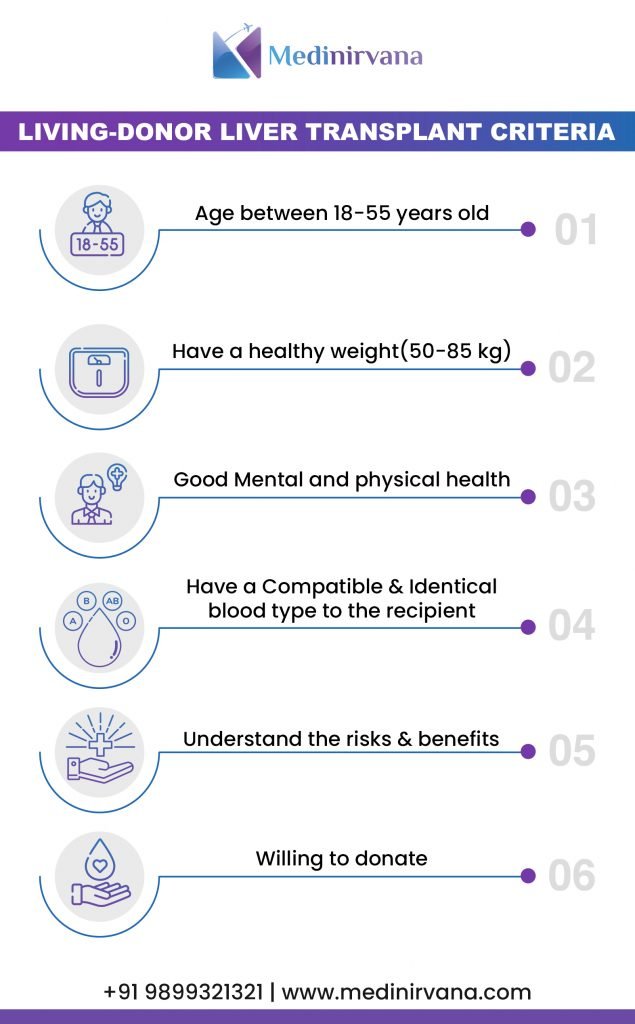The liver is a vital organ of our body that is involved in a lot of important bodily functions. The liver is responsible for the digestion of fats in our body and also controls the metabolism of various substances like drugs.
The hepatocytes or the liver cells can get damaged due to a variety of reasons, the most common of them being alcohol. Other causes include infections like hepatitis, some drug interactions, obesity, etc. Hepatic or liver failure can be life-threatening if not treated properly.
Although the liver is capable of regeneration, in case of severe hepatic damage, a liver transplant might be the only treatment option available to the patient.
In this article, we will discuss about liver transplants, their survival rates, conditions requiring a liver transplant, quality of life, why India could be chosen to get a liver transplant, etc.
Feel free to skip ahead if one topic catches your eye:
- In which conditions do you need a Liver Transplant?
- How do you prepare for Liver transplant surgery in India?
- How is it done?
- What are the Survival rates after liver transplant surgery?
- Quality of Life after Liver Transplant
- Why Choose India for Liver Transplant surgery?
Take Away
-
In which conditions do you need a Liver Transplant?
Liver failure can occur either in a short duration of time or can take up to months and years to develop. The former condition is known as acute liver failure, whereas the latter is known as chronic liver failure.
Acute liver failure can be caused by infections like hepatitis and some drugs like acetaminophen, amiodarone, etc. Liver transplant is not usually required for acute liver failure which can be treated by removing the cause of liver failure like using antimicrobials or withdrawing the causal drug.
Chronic liver failure can have many varied causes. This condition usually occurs when cirrhosis or fibrous tissue is formed in the liver that stops the proper functioning of hepatic cells. When a significant part of the liver is not functioning, this leads to hepatic failure. The best treatment option for the end stages of the disease is a liver transplant. A liver transplant is also a very good option for people who are suffering from liver cancer, which is one of the most deadly cancers known to humans.
Chronic liver failure can occur due to a variety of causes, some of those are listed below:
- Alcoholic liver disease
- Non-alcoholic fatty liver disease
- Genetic diseases like hemochromatosis (excess iron in the body), Wilson’s diseases (excess copper in the body), etc.
- Diseases affecting the circulation of bile in the liver like primary biliary cirrhosis, primary sclerosing cholangitis, and biliary atresia, etc.
- Portal hypertension
- Hepatocellular carcinoma
A person suffering from chronic liver disease will suffer from various symptoms like jaundice, ascites (accumulation of fluid in the abdomen), anasarca (generalized edema), etc.
-
How do you prepare for Liver transplant surgery in India?
The decision of undergoing a liver transplant is a huge decision, and the patient and family members should be mentally ready for the whole procedure. After the patient has decided to have a liver transplant, there might be some waiting depending on the availability of the donor liver.
The patient will undergo numerous tests like blood tests, radiological investigations, etc to establish the following few things:
- Find out the exact cause for liver failure and cirrhosis
- Check the severity of the disease
- Look for exact locations of tumors
- Evaluate the potential risks of the procedure on the patient
- Ensure that the other organ systems of the patient like the heart, lungs, etc are in good condition to handle such a major procedure.
At the same time, the search for a prospective donor will be going on and some conditions need to be satisfied to have a transplant which are listed below:
- The donor should have a compatible blood group with the recipient.
- Donors should be between the age of 18-55 years old.
- The donor should not be obese as this can cause fatty liver in the donor, making the liver unsuitable for donation.
- The donor should have overall good physical and mental health.
- The donor liver should be big enough to be able to support both the recipient and the donor himself.
While liver transplant is legal in India, certain laws govern the whole procedure to prevent the commercial sale of human organs. Some certain rules and regulations need to be followed, and the patient requires some documents for the same.
The donor should be above the age of 18 years and should be voluntarily giving his liver to the patient. All this will be given by him/her in informed consent.
The various documents that are required before the procedure are:
- The identity proof of donor, recipient, and donor’s near relative. These include Birth certificate, Marriage certificate, Photo identity Card, Passport, Driving License, Old photograph depicting recipient, donor, and donor’s close relative, or any other proof like a Certificate along with photographs attested by the high commission of their country.
- In case the donor is not a near relative, then in addition to the above-mentioned documents, the doctors will also require the following documents from you :
- Proof of unfit donors.
- Proof of income of donor and recipient.
- International patients have to come on a valid medical visa of patient & donor & medical attendant visa of the donor’s close relative.

3. How is it done?
After all the matching and the formalities are done, and a suitable donor has been found for the patient, the process of the transplant can be initiated. Before the procedure, the patient will be given some immunosuppressors to suppress the immune system, which in turn decreases the chances of rejection of the organ.
There are various types of liver transplants depending on the donor. These can be broadly divided into two types:
- With living donor
- Deceased donor
As the name suggests, in living donor transplants, the liver is donated by a live person. Although we have only 1 liver and it is required for survival, the liver cells can regenerate. This allows for some part of the donor’s liver to be transplanted into the recipient’s body. This procedure is a little more complicated because since the liver is being donated from a live person, the well-being of the donor also needs to be kept in mind while performing this type of transplant.
The other type is when the liver is transplanted from a deceased donor. This could be from a completely deceased person or a brain-dead donor. In case the patient is dead, the liver must be transplanted at the earliest to maintain the vitality of the organ.
The post-op pain in the case of liver transplant is not as severe as other abdominal surgeries. These nerves repair in about 6 months and the sensation returns back. The patients most commonly suffer from back pain depending on the time spent on the operation table.
-
What are the Survival rates after liver transplant surgery?
- Liver transplants have a 1-year survival rate of about 89%. This means that about 89% of the people who get a liver transplant will live at least for a year.
- The 5-year survival rates of liver transplants are about 75%.
- The 10-year survival rate is about 60%.
- Whereas there is an operable success rate of about 86%.
The patient will be required to keep undergoing medical checkups periodically to keep a track of their physical health and particularly the status of the transplanted liver.
The success rates and the survival rates of the procedure can depend on a variety of factors like:
-
- Lifestyle after the transplant: A good diet and an adequate amount of exercise will not only keep the patient healthy but will also reduce the risk of rejection of the donor’s liver.
- Alcohol consumption
- Smoking
- Obesity
- Cholesterol levels.
-
- Medications: The patient should avoid all kinds of hepatotoxic medicines like acetaminophen, etc to have a better survival rate.
- Age at transplant
- The severity of disease at the time of transplant.
The patient should keep a check on all these factors to decrease the complications of the transplant surgery and to prolong their survival rates.
-
Quality of Life after Liver Transplant
Most people can resume their normal life in about 3 to 6 months. The initial recovery period is the toughest for the patients and family members. During this time, the body is adjusting to the new liver and the patients need to take all their medications like immunosuppressors to decrease the chance of rejection of the donor liver.
The patients will be admitted to the hospital to be kept under medical supervision for about 3 months and will only be discharged when the doctor is assured that the patient has achieved optimal recovery.
After this recovery period, the patient can lead a fairly normal life resuming required physical activities. There will be certain restrictions like alcohol, smoking, hepatotoxic drugs, etc. Other than that, the patient can have a completely normal life. Regular checkups are required to know the status of their health and the donor liver.
-
Why Choose India for Liver Transplant surgery?
India has one of the best healthcare facilities in the world. With top-class hospitals and highly trained and qualified doctors and staff, India is one of the best countries to have a liver transplant. The patient will face no language barriers in India as all the staff is fluent in written and spoken English.
It is relatively easier to get a medical visa in India, which makes the whole process more convenient. The cost of liver transplants in India is relatively much less than other countries. This ensures best treatment at the most affordable costs. The price depends on factors such as the skill and experience of the surgeon, the hospital, the city where the patient is getting treatment, etc.
Take Away
This was a brief article on liver transplants in India and everything you need to know about them. For further guidance, contact a qualified professional who will be able to guide you further.
At Medinirvana, we ensure that you get the most hassle-free treatment experience and you do not have to worry about any formalities, instead you can focus on your patient’s health and well-being properly.








Leave a Reply